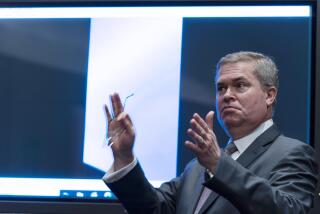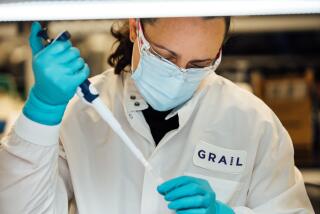Lawmakers call for answers on BioWatch security system
WASHINGTON — Congressional leaders from both parties are pressing Homeland Security Secretary Janet Napolitano to address newly raised questions about BioWatch, the nation’s system for detecting deadly biological attacks.
In letters issued Thursday and last week, the leaders said their questions were prompted by a July 8 Los Angeles Times article that identified repeated shortcomings in BioWatch’s performance, including dozens of false alarms that signaled apparent terrorist attacks when none had occurred.
The first of the letters was sent last week by Rep. Bennie Thompson of Mississippi, the top Democrat on the House Homeland Security Committee. Thursday’s letters were signed by the chairman of the House Energy and Commerce Committee, Rep. Fred Upton (R-Mich.), and Rep. Cliff Stearns (R-Fla.), who heads the panel’s Oversight and Investigations Subcommittee.
Upton and Stearns requested emails and other internal Homeland Security documents related to BioWatch. Those materials, the congressmen wrote, might “assist the committee in finding out how the BioWatch program is actually performing, and whether it is meeting public protection goals without unduly disrupting the public health system and local emergency responders.”
In a separate letter sent Thursday to Dr. Thomas R. Frieden, director of the federal Centers for Disease Control and Prevention, Upton and Stearns asked for other documents related to BioWatch, which the agency has worked with since the biodetection system was deployed in more than 30 major cities in 2003.
Thompson, in his letter to Napolitano, cited the newspaper article’s spotlighting of deficiencies with both the existing BioWatch system and “Generation 3,” intended to provide swifter and less costly biodetection. The Times reported that prototypes for the new, automated technology have malfunctioned in field and laboratory testing over the last several years.
Napolitano and her aides are weighing whether to go forward with Generation 3, which would cost about $3.1 billion over the next five years, on top of the roughly $1 billion that BioWatch has already cost taxpayers.
Thompson, noting Homeland Security’s past assurances of solid performance, said it was “troubling” that “in this austere budget environment, the department appears committed to the development of this program — at the expense of other important Homeland Security programs — despite evidence that an accurate, effective BioWatch technology program may not be feasible.”
The Times article, based on previously unpublicized government documents and interviews with scientists familiar with BioWatch’s operations, illuminated two persistent problems: The system has been unable to distinguish between some lethal pathogens and organisms that pose no harm to humans. And though no biological attack has occurred during its nine years of operation, tests and computer modeling suggest it would have difficulty detecting one because of inadequate sensitivity.
The article also reported that, as of 2008, federal agencies had documented 56 BioWatch false alarms, most of them never disclosed to the public. One of the incidents threatened to disrupt the final night of the August 2008 Democratic National Convention in Denver, when Barack Obama accepted his party’s nomination for president.
In their letter to Napolitano, Upton and Stearns noted that Homeland Security’s chief medical officer, Dr. Alexander Garza, had said The Times’ reporting of the false alarms was “unsubstantiated.” In a department Web posting July 12, Garza said: “To date, more than 7 million tests have been performed by dedicated public health lab officials and there has never been a false positive result.”
The congressmen, who were unavailable for further comment Thursday, reacted skeptically to Garza’s characterization of the events.
“We note that Dr. Garza’s representation that BioWatch has never had a false positive result is at odds not only with the incidents reported by the Los Angeles Times but also with the observation in an October 2010 report on the BioWatch program by the National Academy of Sciences,” the lawmakers wrote.
Upton and Stearns alluded to an academy committee that rejected Homeland Security’s assertion that the dozens of incidents, which the department calls BioWatch Actionable Results, or BARs, were not false positives. The committee concluded that every BAR “signaled the potential occurrence of a terrorist attack when none has occurred.”
A Homeland Security spokesman said Thursday that the department would respond to the members of Congress “directly, not through the media.”
More to Read
Sign up for Essential California
The most important California stories and recommendations in your inbox every morning.
You may occasionally receive promotional content from the Los Angeles Times.











